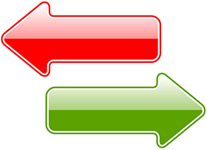Completing the Claims Process
So you got into a car accident. Maybe you rear-ended another car in heavy traffic, or ran off a twisting country road. You've filed your claim, submitted all of the relevant paperwork, the car is back from the shop, and your injuries have healed. So it's all over, right?
Not quite, unfortunately. After you submit an insurance claim, you're going to have to deal with changes in your insurance rates. Depending on the type of accident, the extent to which you were at fault, and how much the accident cost your insurance carrier, these changes could be relatively small, or they could put a big dent in your bank account. Remember: car insurance is a business. Carriers are going to earn their money back some way or another. Insurance is a great way to ensure you have the resources at hand to pay for an accident when it happens, but there's no such thing as a free ride.

Rate increases
With some policies, if you file a claim for under a certain threshold (usually $500 to $1,000) your rate might not go up at all, even if you were found to be at fault in the accident. But after about $1,000 in damages almost all insurance carriers will increase your premium. Typically, premiums remain raised for the next three years, although it varies from state to state. The increase generally takes effect the next time you renew your policy, which could be as long as six months or a year after the accident.
The amount by which your premium will increase is affected by several factors in addition to how much the accident cost the insurance company. Many carriers charge extra for accidents in which you were determined to be a larger percentage "at fault." For example, if you were determined to be less than 50% at fault in an accident, you would receive a smaller rate increase than if you were determined to be more than 50% at fault, even if the damage cost the insurance company the same. (If you were not determined to be at fault in the accident at all, your rate may not increase, although this varies.) Some carriers also vary your rate increase depending on how much time you have been insured with them. So for example, while your rate might go up 15% if you have been with your insurance company three years or fewer, it would go up only 10% if you have been with the same company five years or more.
One of the biggest factors affecting your rate increase is whether you have any previous accidents on your record. With many carriers, the increase after a single accident is relatively low, or even for those with accident forgiveness, nonexistent. But after the second accident, the rate can jump to twice what it was before or more! Finally, keep in mind that it's not only accidents that lead to insurance rate increases. Things like traffic tickets can lead to increases as well. Make sure to report citations to your insurance company, as trying to withhold such information could get you in trouble.
Cancellation and non-renewal
If you have gotten into multiple accidents in which you were at fault, or if your driving record deteriorates, your insurance company may choose not to renew your policy when it expires. Accidents involving drunk or intoxicated driving, for example, frequently prompt insurance companies to refuse to renew a driver's policy. Generally speaking, drivers with three or more violations may begin to have problems with non-renewal, although this varies. A non-renewal doesn't necessarily mean you won't be able to find insurance anywhere, so shop around - but you'll likely pay the price in steep premiums.
If you have had an insurance policy for more than 60 days, your insurance policy can be cancelled outright only if you fail to pay the premium, if you have committed fraud on your application, or if your drivers license has been revoked or suspended.

Switching companies
If your rate goes up considerably after an accident, you can always start shopping around for better car insurance rates. Different companies have different surcharges depending on the violation, so you may be able to find an insurance carrier that's better than your current one. Most companies offer free comparison quotes. If you don't want to switch companies, you can also consider using alternative quotes to negotiate with your current provider.
Keep in mind that even if you switch companies, the record of your accident will follow you. Merely switching insurance carriers won't erase an accident - or its effect on your premiums.
Staying claims-free
The best way to stay claims-free in the future is to drive carefully and conscientiously. That means keeping your eyes on the road and avoiding all possible distractions, including loud or rambunctious passengers, eating or fiddling with the radio while behind the wheel, and talking or texting on your cell phone while driving. You may also want to avoid driving whenever possible in adverse weather conditions. Make sure you lock your car to avoid theft, and try to park in well-lit areas.
In addition to driving carefully, some states require insurance companies to lower your premium in you take a state/DMV-approved driver's safety course.





